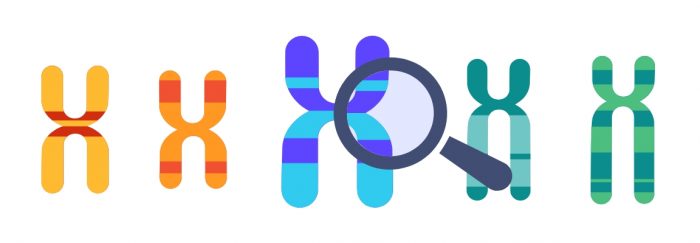Professional athletes end up following personalized training, routines, and diets, but lately, another factor is being taken into account in personalization: discovering their genetics.
We already had a previous article on the subject, DNA tests for athletes, but we have decided to update it and add a new one explaining the advantages of incorporating knowledge of your own genome in sports:

DISCOVER YOUR GENETIC PREDISPOSITION TO MUSCLE DAMAGE
Some muscle damage is necessary for its growth. It serves as a positive stimulus for its remodeling and restructuring, giving athletes what they want: growth and strength gain.
We emphasize the part of “certain damage.” Excess causes muscle degradation and, as a bonus, the release of its content into circulation, with the risk of causing additional damage.
The biggest factor in muscle damage, even more than genetics, is age. Older people are more susceptible to muscle injuries, regenerate muscle slowly, and have difficulty remodeling and gaining.
But certain genetic variants have been associated with a higher risk of sports-related injuries or phenotypes that predispose athletes to injury.
Finding consensus among the different and numerous studies is not easy. Although it is proven that elite athletes have different genetic profiles than the general population, they must be interpreted within the variations due to ethnicity, age, or gender.
For example, it has been found that the SLC30A8 gene has a variant that in men causes less loss of strength and muscle pain after exercise. No changes were found in tests with women.
The two most studied genes in this field, and perhaps in all fields of sports genetics, are ACTN3 and ACE.
- ACTN3 encodes a protein called α-actinin-3, with a structural function within the muscle. Two alleles are considered, an R allele that produces the normal protein, and an X allele that produces a non-functional version. It seems that people with RR or RX, who have the protein, are better in power and speed sports. In contrast, people with XX, without the protein, have better endurance capacity.
- ACE encodes an enzyme whose main function is to convert angiotensin I into angiotensin II. However, and it is not known how it does it, there is a genetic variant that is related to higher levels of enzyme production, and with a higher proportion of fast-twitch muscle fibers and higher speed.
Both genes also present variants linked to the predisposition to suffer injuries during sports. This list includes the genes AMPD1, CKM, and MLCK, among others.
Precisely in our genetic test, in the study of exercise-induced muscle damage, one of the genes we analyze is ACTN3.
Knowing this information, you can individualize your workouts with the aim of maximizing your recovery times and decreasing the risk of subsequent injuries.
KNOW YOUR RISK OF DEVELOPING OTHER MUSCLE INJURIES
There are other types of injuries in sports regardless of the muscles.
Tendinopathies are an inflammation of the tendons, the connective tissue that connects muscle to bone. The state of the tendons influences sports performance and is influenced by genetics.
Certain polymorphisms in the genes COL1A1, COL5A1, and MMP3 have been associated with a prevalence of tendon and ligament injuries. That’s why we analyze them in upper limb tendinopathies and lower limb tendinopathies.
In case you were going to check it in a dictionary, the difference between the tendon and the ligament is that the latter connects a bone to another bone, not to the muscle. Achilles was all muscle and that’s why they named a tendon after him. Or something like that, we are a genetics blog, not Greek mythology.
Since muscle damage involves inflammation, genetic variations involving the inflammatory process are also related to sports injuries.
A person who, due to genetic or non-genetic causes, has exacerbated inflammatory processes, will also have recovery times for injuries longer than the average. It is believed that polymorphisms in the IL6 and IL6R genes, studied mainly for their involvement in inflammation, predispose to ligament rupture.
Similarly, knowledge of these proinflammatory genes would be relevant for predicting the healing process in the injured person.
And muscle cramps? They occur when the muscle tenses unintentionally and then has trouble relaxing. Common after intense exercise, when the exhausted muscle receives more activation signals than relaxation signals and is too tired to know what to do. It is suspected that the COL5A1 gene, mentioned above, may have variants involved even in something as simple as an uncomfortable and persistent muscle cramp.
DISCOVER YOUR MUSCLE PERFORMANCE
Muscle performance is the ability of a muscle or group of muscles to generate force repeatedly against resistance. Your muscle performance is determined by various factors such as your strength, fiber type, training, diet, and your genetics. In our genetic test, the ACTN3 gene comes to say hello again.
With the study of this gene and the results of your genetic test, you can learn if you have a greater genetic predisposition for speed exercise (fast fibers) if your genotype is CC, or for endurance exercise (slow fibers) if the results of your genetic test show that your genotype is TT.
But muscle performance doesn’t just depend on the muscle, strange as it may sound. The AMPD1 gene has a genetic variant whose carriers have a lower maximum amount of oxygen that the body can handle in a given time (abbreviated as VO2 max). These individuals have a lower response to endurance exercise.
Speaking of muscle and energy, the CKM gene encodes an enzyme that participates in the energy homeostasis of the muscle, by moving phosphate groups between ATP and creatine (a protein with energy storage function in the muscle). Variations in this gene negatively affect prolonged muscle performance.
In general, it is expected that any genetic variation that negatively affects energy metabolism, either directly or indirectly (such as oxygen uptake and subsequent handling by the body), will impact muscle performance, and not in a pleasant way. We have reached a time where we have personalized medicine, based on genetics. The concept of personalized training involving individual genetics seems very credible. The tellmeGen DNA test kit can help you prepare for the future.



